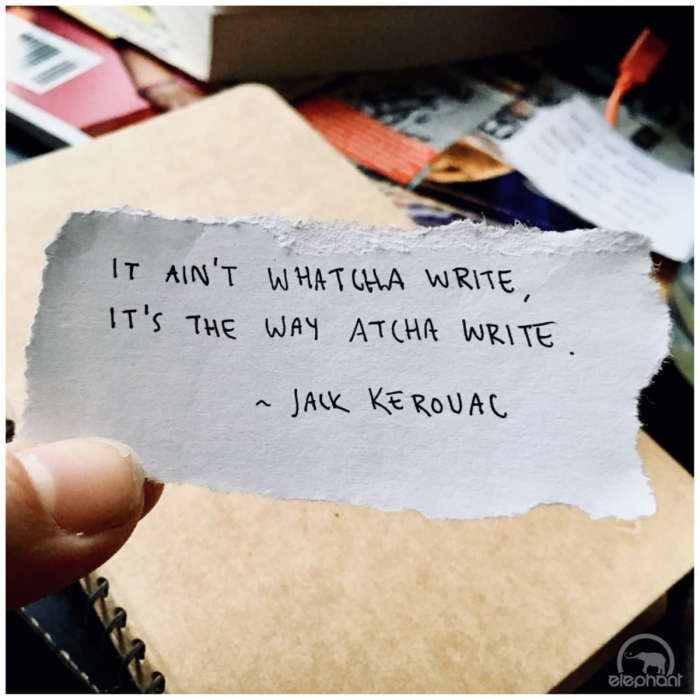Author’s Note: Writing is my passion, I made it my profession, and lucky me, I am the former Co-Director of Elephant Academy here at Elephant, where we teach people to find their voice & write their heart out. Join Elephant’s Editor-in-Chief Waylon Lewis, and unleash your inner Angelou.
Writing isn’t just about creating something beautiful.
Writing isn’t just about self-expression.
Writing isn’t just about catharsis.
But writing is all of those things—at least a little bit, every single time.
The thread that ties each of these elements together, that connects every word to its sentence and every sentence to its paragraph and every paragraph to its reader’s heart and mind, is the writer’s voice.
When a writer has found their voice, a certain alchemy happens. The invisible gap between the writer’s mind, the letters on the page, and the reader’s mind closes.
So how does a writer find this voice? Well, I’m glad you asked.
How to find your voice in 6 steps:
1. Start by saying nothing.
When you wake up in the morning, before you do anything else, meditate. It can be five minutes or it can be an hour. The point is to touch in with your basic goodness, relax your mind, and start teaching yourself how to regard your thoughts (whether they are ideas, self-talk, or distractions) as something impermanent and manageable.
Or, if traditional meditation isn’t your thing, just indulge yourself in the art of doing nothing. Get quiet. Get in touch with the way your thoughts move.
2. Follow that by saying anything.
Once you’ve said nothing—it’s time to say anything. The hardest part of writing always seems to be actually starting to write. We want the first sentence to be perfect; we want to know the end before we construct the beginning; we want to wait for a bolt of inspiration to strike.
A much less stressful way to go about it: just start writing. Write anything. A story from your childhood, the description of the room you’re in, an overly detailed account of the vegan muffin immediately to your left. No one ever has to see it, and you never have to look at it again—but it will get you over that anxiety of staring at a blank page, and you never know where that memory/couch/muffin will take you.
3. Try on a few (written) voices.
Write a poem. Do an interview. Try a long-form essay. Give a novella a shot, if you’re feeling wild.
Some of these will flow more naturally than others, and how the writing flows is a pretty good indication of your voice coming through. That doesn’t mean you have to limit yourself to this form, but take note of what felt right about that poem, say, and see how the topic or language or tone might translate into an essay.
Learn more about Elephant Academy’s Find your Voice course, here >>>
4. Listen to your (actual) voice.
Close your eyes for a minute. Imagine you’re a server in a restaurant. You approach your first table of the night and say: Hi folks! I’m Alex, and I’ll be your server tonight. Our specials are…
Now, close your eyes again. Pick up an imaginary phone and call your partner or your mom or your brother and say: Hey, how’s it going?
Chances are pretty good that the voice you just used in the restaurant situation is higher pitched and more tense than the voice you used when you made the phone call. Our voices are great indicators of…well, our other voice. When you’re relaxed and confident, you’ll likely speak in a lower register with steady breathing and no shaking or quivering. Once you hear that voice, listen to the words you’re saying, how you structure your sentence, where you naturally pause—and then write that down on paper. Boom: it’s your voice.
5. Make eye contact.
On the one hand, feedback can be brutal. It can make us sad or angry or uncomfortable and our ego generally grows five times its normal size to try and protect us from anything we don’t want to hear.
On the other hand, knowing how readers respond to your writing is invaluable. You can learn what connects, what doesn’t, and why. So be brave and publish your work. Serialize a few chapters of your book. Get some op-eds or poems out into the world. Every time you do, you make eye contact with your readers, and they’ll guide you back to your voice.
6. Say what the world needs to hear.
The final step in finding your voice? Using it. And the good news is, now that you’ve found your most authentic voice, you’ll naturally start writing more authentic stories that connect with your readers, that are of benefit to our world, and that leave you feeling like you just let out a deep sigh of sweet relief.
There’s more where that came from in Elephant Academy’s Find your Voice Course:
“Once you find your voice, there will be nothing that will stop you from sharing it. Nothing. Address the elephant in the room. If you can’t write about the room, write about the elephant.” ~ Waylon Lewis
You can join Elephant this year for a 9-week training through Elephant Academy, that has graduated thousands over the past 10 years. We keep our classes small so that you have real bonding and community. This is about challenge and change, training and encouragement—this is about you.
This course is about learning how to express oneself genuinely, directly, powerfully. It’s about the fundamental life skill of finding your own voice, finding the power in that voice, and using it to be of benefit.
When: September 4th – October 30th, 2024
What: Find your Voice with Waylon H. Lewis.
Final week to Enroll Early Early and save 25%:



Read 2 comments and reply